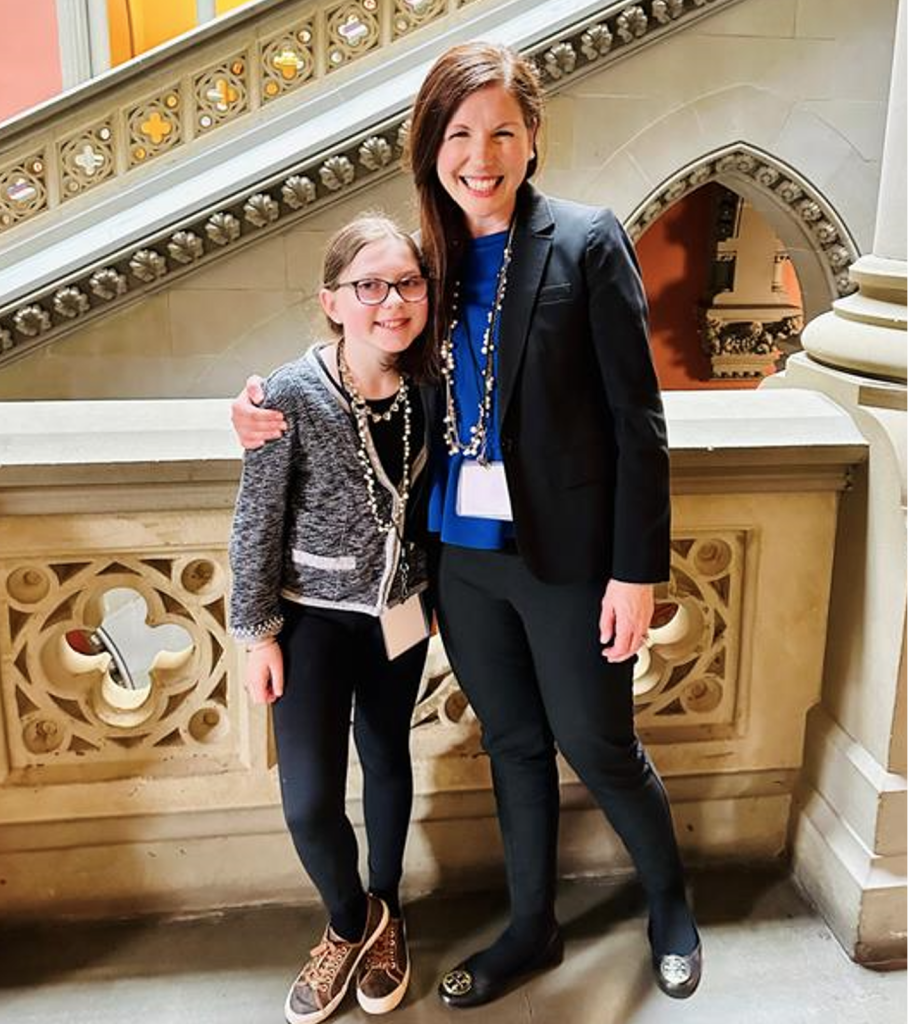
The Power of Precision Medicine: How Biomarker Testing Changed the Lives of a Mother & Daughter
Charlotte was my light at the end of the tunnel when I was going through treatment for breast cancer. My loving, joyful two-year-old daughter was all I needed after every appointment, every procedure, to put a smile on my face and distract me from the discomfort. Watching her hit milestones allowed me to think of the future with hope instead of dread, imagining life beyond the seemingly endless cycles of cancer treatments and surgeries. Just before my two-year anniversary of being diagnosed, our world felt like it was again turned upside down. At four years old, Charlotte was diagnosed with a brain tumor, and we found ourselves facing a new set of milestones. Instead of our usual pre-school routine, we found ourselves at pre- and post-operative neurosurgery appointments.
That was seven years ago. If not for biomarker testing, our lives could look a lot different today. Fortunately, we learned early-on from each of our doctors that Charlotte and I both have biomarkers—the identification of which proved to be essential to our care and survivorship.
Biomarker testing is an essential step in developing a treatment plan that is tailored to a specific type of cancer. By matching patients to targeted therapies, biomarker testing often leads to improved survivorship rates and a better quality of life. I learned after my double mastectomy that my tumors contained high amounts of estrogen receptors. These biomarker testing results gave my doctors the information they needed to prescribe me a daily pill that would lower the estrogen in my tissues, improve my chances at survivorship and limit my likelihood of recurrence.
When it was Charlotte’s turn to undergo the same test, we learned that she had the BRAF mutation in her tumor—the mere presence of which would likely qualify her for a targeted drug. Thanks to biomarker testing, we know that, should she need it, Charlotte can access a targeted treatment that will likely enable her to forgo chemotherapy and its debilitating side effects.
At hearing this news, my husband and I felt hope for the future again. After her neurosurgery, we watched with pride as Charlotte eventually went back to pre-school, rejoined her friends on the playground and reacclimated to everyday life. Charlotte is 11 years old now. She has courageously faced more MRI’s and IV’s than any child or adult ever should. Not only that, Charlotte takes the time to volunteer and advocate for cancer patients and survivors. She is my hero.
While my journey and Charlotte’s are distinct, biomarker results act as a throughline, uniting our experiences in survivorship. We were lucky that our health insurance covered our biomarker testing. Not every New Yorker battling cancer is as fortunate. Currently, in New York, many health insurance plans, including Medicaid, do not cover biomarker testing for all patients who could benefit, despite the data showing its positive impact. A legislative proposal that received near-unanimous support from the Legislature aims to rectify that—and it’s currently awaiting Governor Hochul’s signature.
Senate Bill 1196a / Assembly Bill 1673a will help ensure that more New Yorkers who stand to benefit from biomarker testing have access to it by requiring Medicaid and all state-regulated health plans to provide coverage. The one thing that makes this legislation so special is that its benefits would extend beyond New Yorkers with cancer. While many current applications are in cancer treatment, biomarker testing is also used in the treatment of arthritis and other autoimmune and rare diseases. Recent research suggests it will have applications in the treatment of numerous diseases, including Alzheimer’s and other neurological conditions, cardiovascular diseases and more. Senate Bill 1196a / Assembly Bill 1673a’s disease-agnostic approach means that all beneficial applications of biomarker testing will be covered for all who need it when it is supported by medical and scientific evidence.
The disease-agnostic nature of this legislation also serves to benefit cancer survivors, like Charlotte and me. Because of the strides in cancer research, patients are living longer after a diagnosis so, for many, cancer is becoming more of a chronic condition. Due to shared risk factors and side effects of cancer treatment, many of the cancer patients who are living longer are doing so with one or more comorbidities, like arthritis or cardiovascular disease. The non-oncology biomarker testing applications could be critical to addressing these conditions for cancer survivors, like us.
While Charlotte and I both continue our ongoing oncology checkups, it gives us hope to know that this legislation would help ensure that we, along with millions of other New Yorkers, can access the testing we need for whatever medical conditions we may face down the road.
As a breast cancer survivor and the proud mother to a courageous pediatric brain tumor survivor, I urge Governor Hochul to sign the biomarker bill as-is and reject any efforts to weaken it by limiting who can receive coverage. Every New Yorker who is currently battling or has battled this disease is counting on Governor Hochul to fight for them.

